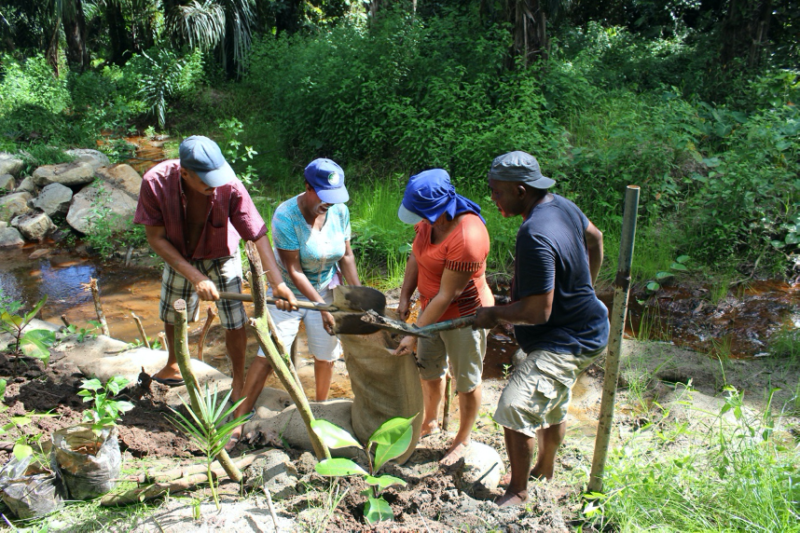Nature-based risk management projects benefit vulnerable communities by making agriculture more sustainable. Like the one in Seychelles, many Adaptation Fund financed initiatives are promoting ecosystem-based adaptation to climate change.
The Seychelles, a small island developing state (SIDS) in the Indian Ocean, acutely feels the impacts of climate change.
The ongoing threat of rising sea levels means the nation, much like the Maldives, is effectively sinking, and that doesn’t bode well for the vast share of the country’s population who inhabit coastal zones.
But by using an adaptation strategy grounded in the use of natural resources, the Seychelles is strengthening its resilience to the changing climate.
An Adaptation Fund financed project, jointly implemented by the United Nations Development Programme and the Seychelles Ministry of Environment, Energy and Climate Change, has focused on two key issues – water scarcity and flooding.
“The estuarine and coastal ecosystems of the Seychelles are some of the most threatened natural ecosystems in Seychelles and, as a tourism destination, adopting ecosystem-based approaches is vital to sustain the pillars of our economy,” said the project’s manager, Betty Victor.
The project predominantly targets Mahe and Praslin; the two largest islands of the widely dispersed archipelago.
For the former, where it is estimated that sea levels are rising by 1.46 mm per year, one approach has been to rehabilitate badly functioning wetlands to the island’s north-western side.
These wetlands play an important role in decreasing inland flood vulnerability as they can reduce water velocity, store excess rainfall, and help to form natural floodways. The project rehabilitated these wetlands, as well as others in the Seychelles.
The project included building a natural retaining wall with only rocks, aggregates and gabion cages (using no concrete) to store water in the restored upland wetland.
“Nature-based approaches are less harmful to the physical environment and strive to preserve the ecosystem services and functions that support basic human needs,” said Victor.
“They work because local communities are inclined to protect critical habitats when they understand that these resources can build resilience and reduce disaster risk,” she added.
As well as the tangible applications the project has generated, the Fund has also helped to introduce education on climate change into the school curriculum, and specifically the situation faced by the Seychelles.
The EBA project has benefitted our community with practical expertise and knowledge of how to protect and preserve our environment using nature based solutions, allowing nature to restore nature,” said Mr Gonzalves Pool, Chairperson of the project’s Caiman Watershed Committee.
This isn’t the first time the Adaptation Fund has incorporated ecosystem-based approaches into its adaptation work.
In India, a project implemented by NABARD has been concentrating on restoring degraded mangroves which will promote natural systems to protect livelihoods from flooding and erosion.
Another project in India is using climate-resilient approaches in the forestry and wildlife sectors by building adaptive capacities of communities, livelihoods and ecological security.
A similar approach has been seen in Cambodia where a project implemented by UNEP with the Ministry of Environment looked at climate smart reforestation methods while diversifying vegetable production through home gardens and enhancing water security to combat failing agricultural productivity due to erratic rainfall.
“It helps the villagers to see there’s still some forest intact for the future generation, and now I have money I can put towards my children’s education and my family’s health,” said Kim Pheng, a beneficiary of the Cambodia project.
Nature-based solutions, an umbrella term that encompasses the concept of ecosystem-based approaches, are now more important than ever as countries across the globe deal with the coronavirus pandemic.
These approaches foster biodiversity, sustainability, conservation and climate-smart techniques that build resilience against climate change, as well as environmental, health and economic challenges.
“Many Adaptation Fund projects use ecosystem-based approaches to tackle climate change,” said Mikko Ollikainen, the Fund’s manager.
“They benefit vulnerable communities by making agriculture, water access, protections against sea rise, floods, disasters and outbreaks more sustainable, healthy and natural, while enhancing peoples’ lives and livelihoods,” he added.
Small island developing states like the Seychelles are no less vulnerable to climate change as they consider the, now, additional threat of Covid-19.
While leaders focus on immediate emergency responses to slow the spread of the disease, there is much deliberation on how nations must consider incorporating green packages when rebuilding economies and societies.
Approaches rooted in protecting and restoring natural ecosystems are key to reducing the risks of future pandemics, while simultaneously fighting climate change, in a sustainable way.

Farming couples of the Baie Lazare Watershed Committee using coir logs to lead the way in EBA wetland restoration (Photo: GOS-AF-UNDP EBA project)
Nature-based solutions can be seen in many other AF-funded projects across diverse sectors and regions.
A project in Antigua and Barbuda is restoring natural drainage canals and ponds to protect against sea rise and floods, and improve flow of stagnant water pools that attract breeding mosquitoes and other disease vectors.
In Honduras, an AF-funded project is utilizing reforestation to manage extreme rainfall variability, flooding, erosion and landslides, while in Cuba a project is engaging youth to plant mangroves along vulnerable coasts to restore biodiversity and natural protections against sea surges and to protect inland water supplies.
Projects in Senegal and Mauritius are also restoring mangroves against sea rise, and a project in Mongolia is managing water through natural systems.